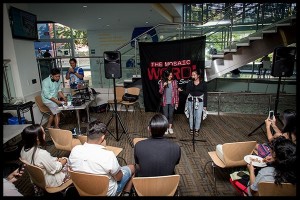
Photo: David Schmitz
The MOSAIC Cross Cultural Center engages with a variety of workshops and activities, including an open mic event from fall 2015.
For the first time this fall, San Jose State University has four faculty members embedded as fellows at the MOSAIC Cross Cultural Center and the PRIDE Center. The faculty members will be working closely with the student populations who are supported by both centers while conducting research to find ways to create a more inclusive and welcoming environment at SJSU.
Erica Boas, an adjunct faculty member in the College of Social Sciences’ Sociology and Interdisciplinary Social Sciences Department, is one of three faculty members working with MOSAIC Director Hyon Chu Yi-Baker and student diversity advocate interns. The other fellows include Funie Hsu, an assistant professor of American Studies, and Manolo Callahan, a Mexican American Studies professor.
“It’s a great way to work with undergraduates,” Boas said, noting that she appreciates the diversity reflected in the student population at SJSU. “I am looking forward to getting to know the students and working with them on social justice issues and activism.”
Boas’ particular areas of interest include sexuality and race. Each faculty member will work closely with the diversity advocate interns and undertake a research project around diversity.
“There is a lot of potential at this place right now to go deeper and use our centers on campus that fill an authentic need given some of the hate speech that has been overt on campus,” she said. “MOSAIC hopes to create honest, deep discussions around these issues, so people have a place to go to talk about them.”
Boas grew up in “pre-gentrification San Francisco.” As a university student, she was interested in race and sex education, how identity influenced politics and how people live together. Around 37 percent of SJSU students identify as an underrepresented minority (Black or African American, Hispanic/Latino and Native American) and the university was recently ranked as the 14th most racial and ethnically diverse four-year public university in the U.S. by the Chronicle of Higher Education.
“We are meeting with the students twice a week for office hours,” she said. “We are organically getting to know them.”
“It’s very new, but it’s exciting,” said Jenna Edra is a second-year social work student who works at MOSAIC, of the Faculty Fellows program. “They are going to help with the program and diversity advocates.”
In addition to the research, the Fellows will be helping interns to plan workshops for other students at the university. The activities will be posted on the MOSAIC website.
“It’s great being with the students as colleagues, as opposed to being with them as a professor or teacher,” she said, noting that professors set the agenda in their classrooms. “We are meeting the students where they are in an authentic way.”
Stephanie Preston, a counselor in SJSU’s Counseling and Psychological Services department, is a Faculty Fellow at the PRIDE Center. When she became a faculty counselor in 2014, she was encouraged to get to know the cultural centers on campus and she got involved with the Peers in PRIDE program that supports lesbian, gay, bisexual, transgender and queer (LGBTQ) students.
Preston is spending eight hours a week at the PRIDE Center where she is continuing to connect with students. But she is also working closely with PRIDE Center Director Bonnie Sugiyama to create a needs assessment for LGBTQ students that will help pinpoint ways to make the campus a more welcoming space.
“The last assessment was conducted in 2008 before there was a PRIDE Center,” she said. “There was only a student group, so it was a very different landscape.”
Sugiyama noted the results of the previous reviews, conducted by a faculty counselor, provided the basis for creating the PRIDE Center and the Peers in PRIDE mentor program.
“We haven’t done another study to see what people’s needs are now – what they are looking for that they don’t see,” Sugiyama said. “It really takes a lot of time to go through the Institutional Review Board (to conduct research), so it’s really helpful to have a faculty fellow dedicated to it.”
Sugiyama indicated the goal is to use the results of the needs survey to create a strategic plan for the campus that will enhance support services for LGBTQ community members. In the American College Health Association’s National College Health Assessment from 2012, about eight percent of SJSU students who responded to the survey identified as gay or lesbian, bisexual, transgender or unsure of their sexual orientation.
While Preston is hard at work developing an assessment tool for the campus survey, she especially enjoys connecting with the students who visit the center.
“I like hanging out and overhearing their conversations,” she said. “I can introduce myself to the students.”
Sugiyama noted it was important to select a Faculty Fellow who has experience with the community.
“People in this community are astute to whether someone knows their issues,” she said. “They need that to feel safe. It helps to have another person to make sure everyone feels welcome and accepted in this space.”
Like the MOSAIC fellows, Preston will also be working with students on programming. She is hoping to create a mixer or event where students can interact with LGBTQ faculty and staff.
“One mission is educating the campus,” she said. “We can make less supportive environments better.”